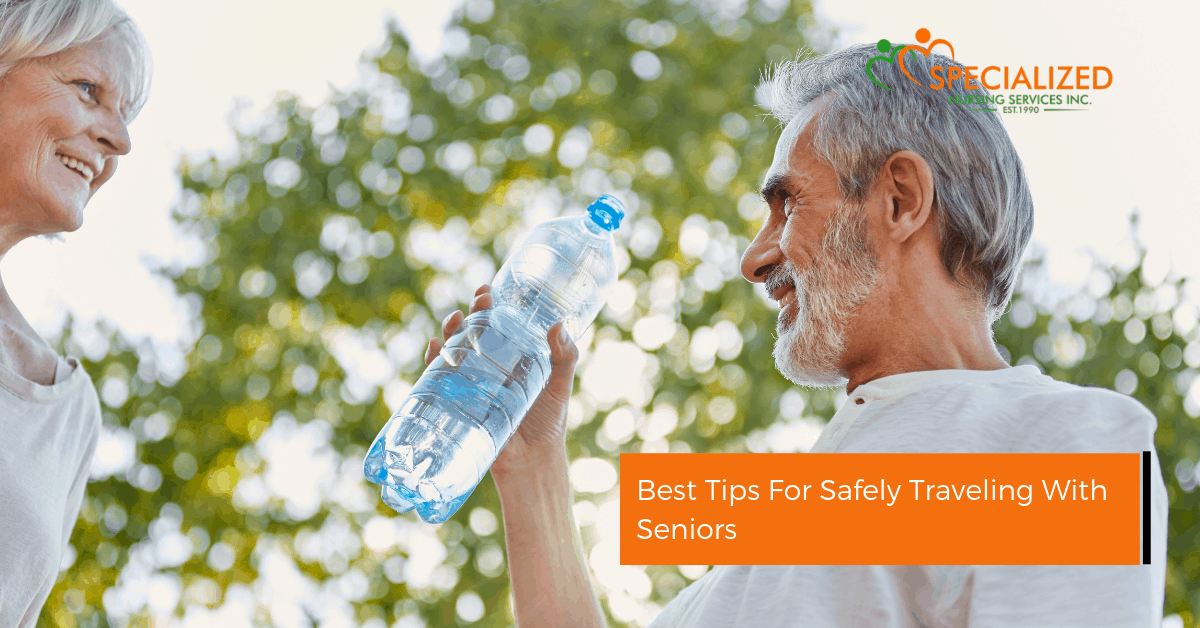Best Tips For Safely Traveling With Seniors
When planning trips with elderly loved ones involved, it can be tough to manage all of the details to ensure a safe journey. Luckily, with a little forethought and a few phone calls, most of the major concerns can be alleviated in advance. Depending on the patients needs and level of discomfort, it can be useful to have a nurse accompany your loved one to ensure they are always well taken care of. Specialized Nursing Services is proud to assist you and your family in travel nurse care. Whether or not you travel with a nurse companion, when traveling with seniors it is important to be organized, maintain routine, and be prepared. Here are a few tips on how to safely travel with elderly loved ones.
Be Organized
Have your itinerary planned in advance. When traveling with elderly parents it is important to know where you will be staying and how you will get to and from locations. As a generally able bodied adult, it is easy to take for granted a simple walk from one site to another during travel. Seniors may not have as easy of a time maneuvering bumpy, unfamiliar roads, especially with a walker, cane or other cumbersome equipment. Be sure to find out distances between locations and if taxi services are available. Know where you are going and how you are getting to and from each place.
To this end, consider your trajectories. If you will travel with public transit, call the stations. Ensure there are ramps, elevators, and other accessibility features so your loved one can maneuver. Make sure any institutions you plan to visit are able to accommodate any needs the patient may have.
Similarly, share itinerary information with your parent or loved one in advance so they have time to process and plan. If they need to walk, maybe they will opt to bring their cane after all.
It is just as important to be organized with your baggage as itinerary. Pack essentials, think through what your parent might need. Do they need closed toed shoes, or a warm jacket for example? Being organized means thinking through the trip in advance and having everything mapped out.
Maintain Routine
Travel is a change from our daily lives. We are in a new environment which can make us vulnerable and subject to the new space and its limitations. Especially for eldery, sometimes sick or unstable patients, the disruption provoked by travel can be overwhelming. For this reason it is important to maintain routine. Patients (and all adults!) should wake up and go to sleep at the same time as usual. While in some cases you may need to account for jet lag (which can be offset with a dose of melatonin), sleeping at usual times, and getting a full night’s rest, is the number one way to maintain stability and routine while traveling.
To the same end, be sure to plan and pack enough medications for the duration of the trip, plus a few extra days just in case. Patients should take medications at the same time everyday, just as they would at home.
It is important to incorporate routine daily with aging parents, particularly those dealing with dementia, as it builds in regularity into their lives. This need is much more pronounced while traveling. Try to follow a similar daily schedule as one your elderly parent might follow at home, order foods similar to those they are used to, and maintain meal times. Keep things as regular as possible while on the road as a way to counteract the other immense changes that travel brings.
Be Prepared
Prepare in advance so that your aging parent is always well taken care of, and could see a doctor or nurse in an emergency situation. Travel with documents including emergency contact information for you and your loved one, contact information of relatives or friends back home, important doctors, insurances and other institutions you may need to get ahold of. It is also wise to carry contact information of emergency care clinics, doctors, or hospitals local to where you are traveling in case your parent needs care.
It is handy to travel with a first aid kit, and be prepared with some first response skills, such as CPR and the Heimlich Maneuver. Know signs of heart attacks, strokes, and any other life threatening issues that are specifically relevant to your loved one’s diseases.
Traveling is challenging for everyone, because travel brings change. Travel is particularly hard for seniors and those suffering from illness or disease. To ensure the smoothest travel experience with your elderly parent, be organized, maintain routine, and be prepared. These tools will make your trip much more enjoyable. It can also be useful to travel with a companion nurse to ensure they are always well taken care of, so you can enjoy your trip. Contact Specialized Nursing Services to learn more.
If you have any questions, we’re ready to help. Contact Specialized Nursing Services when you need help.
[gravityform id=”1″ title=”false” description=”false”]


